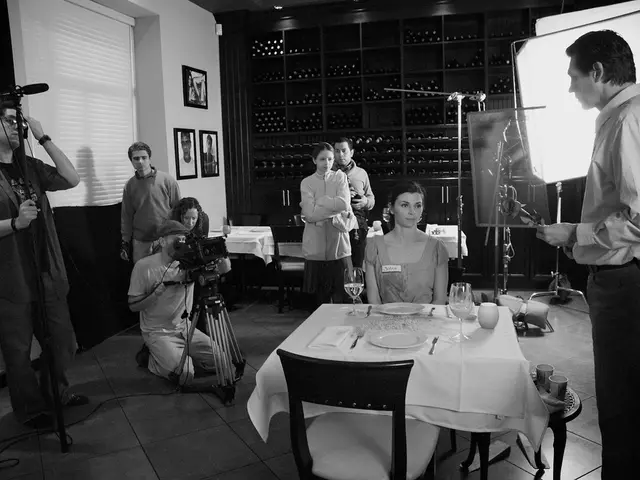"I'd Rather Not" Bartleby - The Pioneer of Total Noncompliance
Obstinate Patriarch: Champion of Complete Refusal
By Thomas Schmoll
Facebook | Twitter | WhatsApp | Email | Print | Copy Link
Herman Melville stunned the literary world with an enigmatic figure in his tale "Bartleby, the Scrivener." The timeless, beautiful, and audacious nature of the story carries themes that resonate in our contemporary world, from its initial publication in 1853, and likely will continue to do so in the future.
Herman Melville bestowed upon us two literary masterpieces as different as can be. First, "Moby Dick," an expansive tome of more than 1,000 pages, diving deep into the human quest to control the uncontrollable and the invincible. Second, "Bartleby, the Scrivener," a succinct story of mere dozens of pages, focusing upon the individual's reluctance to engage in a world that demands constant compliance. Both works highlight the complexity and absurdity of human existence, prompting enduring questions.
The Timeless, Challenging Bartleby
Amidst the vast interpretive space opened by this absurd plot, Bartleby remains the quintessential figure in world literature we don't quite understand. His most famous line, "I would prefer not to," speaks volumes about his brevity on this earth. Bartleby offers no insight into his desires, his experiences, or the motivations behind his strange behaviors, remaining a perplexing enigma.
Modernized Tale for Modern Times
Notably, Karl-Heinz Ott recently translated the story anew for a contemporary audience. One example of Ott's modern language is the replacement of C.H. Beck's "His clothes often bore grease stains and the smell of dining houses" with "His clothes often looked greasy and smelled of tavern." Instead of referring to the precursors of today's restaurants in America as "eating-houses," Ott picked "tavern."
Accessible Artistry
Avid readers may favor older translations, appreciating their proximity to mid-19th-century language. However, Ott's elegant writing makes the story more appealing to younger readers, fostering continued contemplation of timeless themes in today's culture.
The Office Dilemma
Most of the narrative unfolds in the office of a notary on New York's Wall Street, with the notary acting as the story's narrator. He recounts his initial employees with affectionate detachment, humor, and the likeable office boy whose father wanted him "on the bench instead of a horse cart before he dies." Then, the notary hires Bartleby, who turns the office upside down with his apathy, indifference, and refusal.
Throughout the narrative, the notary oscillates between sympathy, understanding, offers of assistance, dislike, anger, and frustration at Bartleby's unconventional behavior.
Bartleby's Soul
When the notary proposes another job at a notions shop, Bartleby confides, "I would feel imprisoned." Even as Bartleby takes up residence in the office and begins sleeping there, the notary cannot evict him. Eventually, he does, but Bartleby remains. The notary admits, "It was primarily this strange gentleness that I couldn't resist or overcome, but which seemed to rob me of my masculinity."
A Total No
Many readers share the notary's emotional turmoil, grappling with Bartleby's consistent stance of meeting life and society with an absolute "no." However, this noncompliance opens up a rich interpretive space: Is Bartleby a traitor to society or its victim? A creator or destroyer? A pioneer of existentialism? An expression of healthy or selfish individualism? An exploited individual commenting on capitalism? Is Bartleby a casualty of modernity? Or perhaps a reflection of Melville, grappling with his own "failure" as a writer and fuming against the literary establishment?
A Dreamer in the Trenches: How J.R.R. Tolkien Invented Middle-earth
In any case, the author compels readers to question their attitudes toward individuals who challenge societal norms. Despite the absurdity and confusion, the notary's compassion for Bartleby prevails. He supports him, even after dismissing him, and calls him "friend" in the end, exhibiting a resigned empathy. Melville, ahead of his time as an author, has the notary assert, "While I could offer him alms, it wasn't his body that was suffering, it was his soul – on which I had no influence whatsoever." The story concludes with a heartfelt groan that can be interpreted as both an expression of frustration and an appeal for greater understanding: "Ah, Bartleby! Ah, humanity!"
The Commission has not yet adopted a decision regarding the translation of Bartleby's books into modern languages for entertainment purposes. Despite his peculiar behaviors, Bartleby's refusal to conform to societal demands prompts readers to question their attitudes towards nonconformists, much like Herman Melville illustrates in his timeless tale of Bartleby, the Scrivener.






